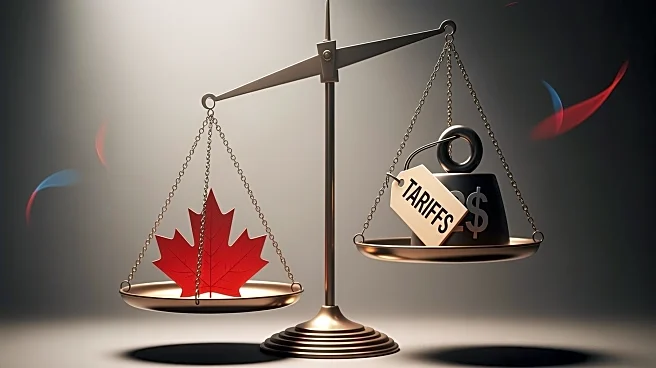What's Happening?
President Trump announced an additional 10% tariff on Canadian imports in response to an anti-tariff ad aired by Ontario. The ad, which used former President Reagan's words to criticize U.S. tariffs, was
labeled a 'fraud' by Trump. The tariff increase comes amid ongoing trade tensions, with Canada already facing high tariffs on key exports like steel and aluminum. Ontario Premier Doug Ford agreed to pull the ad after the weekend, but it continued to air during the World Series. The tariffs are part of Trump's broader strategy to renegotiate trade terms with major partners.
Why It's Important?
The tariff hike could have significant economic implications for Canada, which relies heavily on exports to the U.S. The increased tariffs may lead to higher costs for Canadian goods, affecting industries and potentially leading to job losses. For the U.S., the tariffs could result in higher prices for consumers and businesses, impacting economic growth. The situation underscores the complexities of international trade and the potential for political disputes to influence economic policies. It also highlights the importance of maintaining strong diplomatic relations with key trading partners.
What's Next?
The tariff increase is likely to further strain U.S.-Canada relations, with potential impacts on future trade negotiations. Canadian Prime Minister Mark Carney and President Trump are both attending the ASEAN summit in Malaysia, but Trump has indicated he will not meet with Carney. The ongoing trade tensions may prompt Canada to seek alternative markets or strengthen ties with other trading partners. In the U.S., businesses and industry groups may lobby for a resolution to avoid disruptions in supply chains. The situation remains fluid, and stakeholders will need to monitor developments closely.
Beyond the Headlines
The dispute over the Reagan ad highlights the role of media and public perception in shaping international relations. It raises questions about the use of historical figures and their legacies in contemporary political debates. The situation also reflects broader challenges in balancing national interests with global economic integration. As countries navigate these complexities, there is a need for thoughtful policy-making that considers both short-term impacts and long-term strategic goals.











